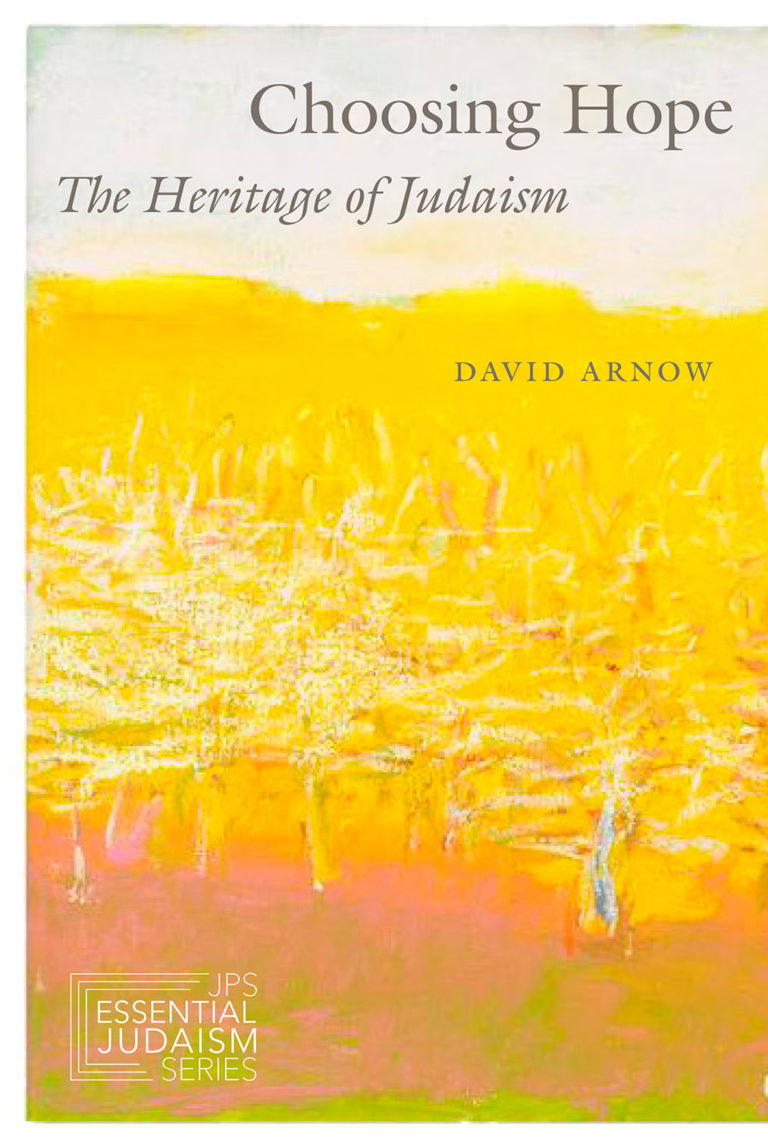Hope Amidst the Ruins
By David Arnow
Published in Perhaps There Is Hope: A Tisha B’AvSupplement, Academy for Jewish Religion, July 2025
The book of Lamentations situates its short discourse on hope in a covenantal theology. God doles out reward and punishment depending on the extent of Israel’s faithfulness, but through repentance, Israel hopes to regain God’s favor. Though I subscribe to a theology in which the outcome of human affairs lies in human rather than divine hands, we can nonetheless glean useful insights about hope from Lamentations. First, I’ll review Lamentations’ hope and then consider how we can apply it to our time. I’ll conclude with some words about the echoes of Oct. 7 and Gaza in Lamentations.
The indictment against Judah is clear. “God has done what was purposed, carrying out the decree that had been ordained long ago, and tearing down without pity” (2:17). “We have transgressed and rebelled and You have not forgiven” (3:42). “The guilt of my poor people exceeded the iniquity of Sodom” (4:6).
God’s punishment is brutal. “All her inhabitants sigh as they search for bread…to keep themselves alive” (1:11). “In blazing Anger [God] has cut down all the might of Israel” (2:3). “Prostrate in the streets lie both young and old. My maidens and youths are fallen by the sword” (2:21). “Better off were the slain of the sword than those slain by famine…” (4:9).
Yet hope persists. “But this do I call to mind, therefore I have hope: The kindness of God has not ended” (3:21-22). “’God is my portion,’ I say with a full heart; This is the One in whom I have hope (3:24). “Perhaps there is hope” (3:29). “For the Sovereign does not reject forever. But first afflicts, then pardons…” (3:31-32). Let us search and examine our ways, and turn back to God” (3:40).
We can draw two lessons about hope from Lamentations. The first calls us to look inward and take a measure of responsibility for the painful situations in which we find ourselves.
Lamentations reveals that Judah’s fault lay not simply in failing to honor God’s commandments, but in a stubborn unwillingness to face reality. The leaders and residents of Jerusalem seem to have harbored the fantasy that the city was impregnable: “The kings of the earth did not believe, nor any inhabitants of the world that foe or adversary could enter the gates of Jerusalem” (4:12). The arrogance here is only matched by the unwillingness to recognize the downfall of other great cities also thought to enjoy the protection of their gods.
The prophet Jeremiah fills in some of the political back story missing in Lamentations. Jeremiah inveighed against antagonizing Babylon: “Serve him and live! Otherwise you will die…by sword, famine and pestilence, as God has decreed against any nation that does not serve the king of Babylon” (Jeremiah 27:13). Instead, Zedekiah imprudently rebelled against Babylon, setting the stage for Nebuchadnezzar’s destruction of Jerusalem and exile of its survivors.
Lamentations also observes that the rulers of Jerusalem “gave no thought to her future” (1:9). As Rashi explains, this means that “they were not mindful of what their end would be,” i.e. they didn’t consider the divine consequences of their sinful behavior. But we can extend that to include a more general failure to properly assess the implications of fomenting rebellion against the overwhelming power of Babylon.
Taking responsibility for the negative consequences of our behavior allows us to learn from mistakes and do better the next time. As such, it strengthens our sense of agency, the conviction that our actions can make a difference, a critical element of hope. Indeed, Lamentations’ discussion of hope calls us to do exactly this: to search and examine our ways. In its day that meant returning to our covenantal obligations to God. Nowadays we might emphasize the importance of learning from wrong-headed decisions and of failing to properly weigh their long term implications.
The second lesson from Lamentations is that hope creates a space, albeit a narrow one, to look beyond the horrors of the present and to imagine a better future. I don’t believe that the principle way to build that future is “turning back to the Lord,” but the call to do so clearly points to the potential of restoration. The book refuses to accept Jerusalem’s smoldering ruins as the end of the story. And likewise, Jewish tradition does not allow us to end the reading of Lamentations with its disconsolate last verse. Instead, after the last verse we conclude with the penultimate verse, one which overflows with possibility: “Renew our days as of old” (5:21).
So despite its theology, the book contains profoundly useful insights about hope. When disaster strikes don’t give up on the vision of a better future, and figure out how to help build it; take some responsibility for how events unfolded and learn from mistakes. (Note well: This last point is sometimes reduced to accusations of blaming Jews for the Holocaust. Jews deserve no blame for the Shoah. But, innocence then does not absolve us from considering our part in the calamities that have befallen us now—with Israel a regional super power.)
Which brings us to the echoes of October 7, Israel, and Gaza in Lamentations.
In Hebrew, the book of Lamentations is called Aikhah which simply means ‘how?’
Aikhah? How did we get here? Israel too fell victim to a fantasy of impregnability—not guaranteed by God, but by a high-tech, thinly-guarded fence that was overwhelmed in minutes. Arrogance fed the group think that Hamas was simply incapable of successfully mounting such a devastating attack despite dire warnings from scattered military intelligence analysts to the contrary. Aikhah? How did this happen?
Aikhah? How did it happen that that this year when I read Lamentations’ harrowing descriptions of death and famine, I will be seeing Gaza today more vividly than Jerusalem?
Aikhah? How will I be thinking about hope? By struggling to face the responsibility for our hand in the unfolding tragedy. By wondering what acts of repentance are required of us. By refusing to accept that tomorrow must be a clone of today.
Biblical translations follow the JPS Tanakh: A Gender-Sensitive Translation.
David Arnow, Ph.D. is a psychologist and author most recently of Choosing Hope: The Heritage of Judaism, davidarnowauthor.com
Get 40% off when ordering Choosing Hope from Jewish Publication Society! Use promo code 6AS22.

